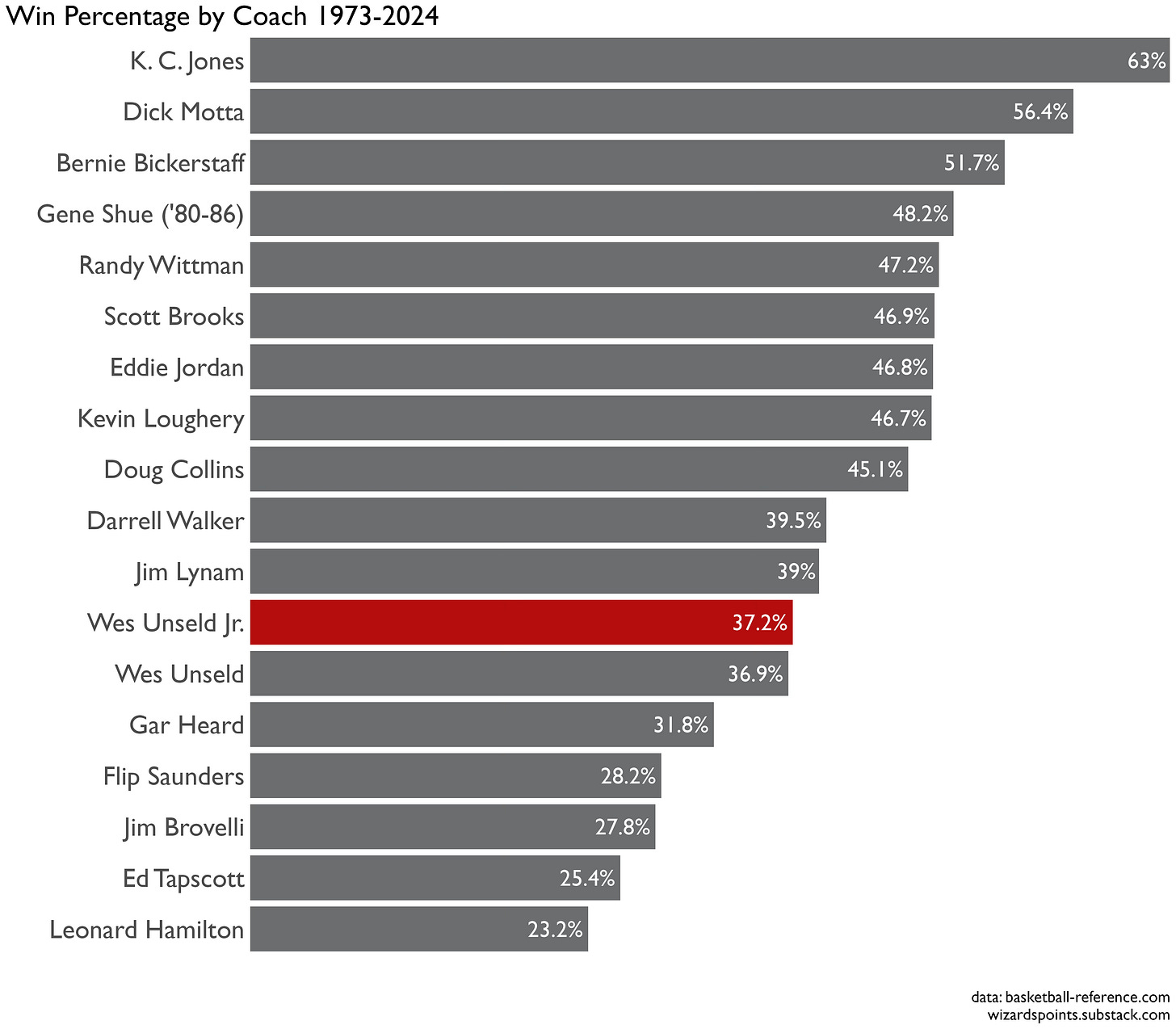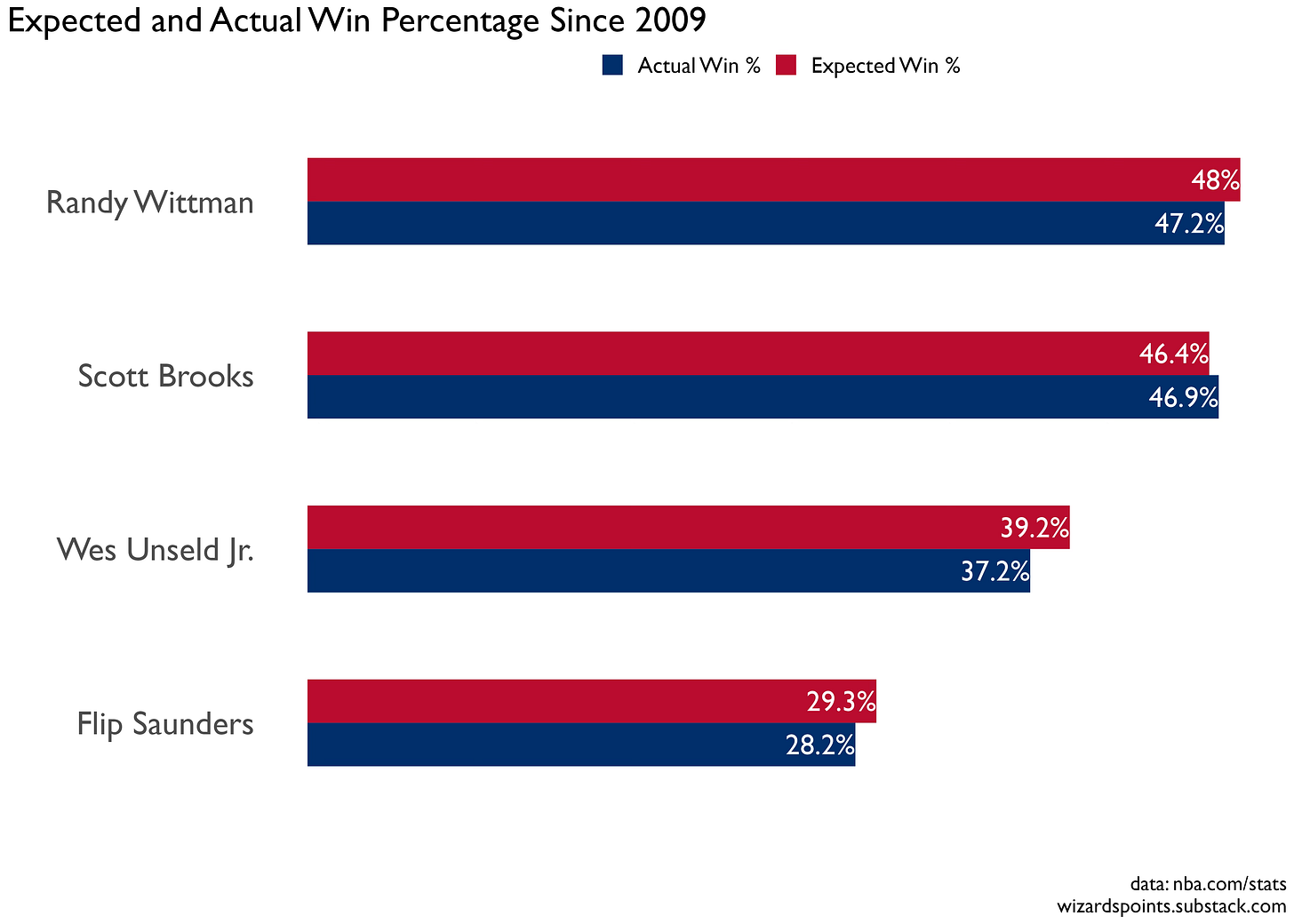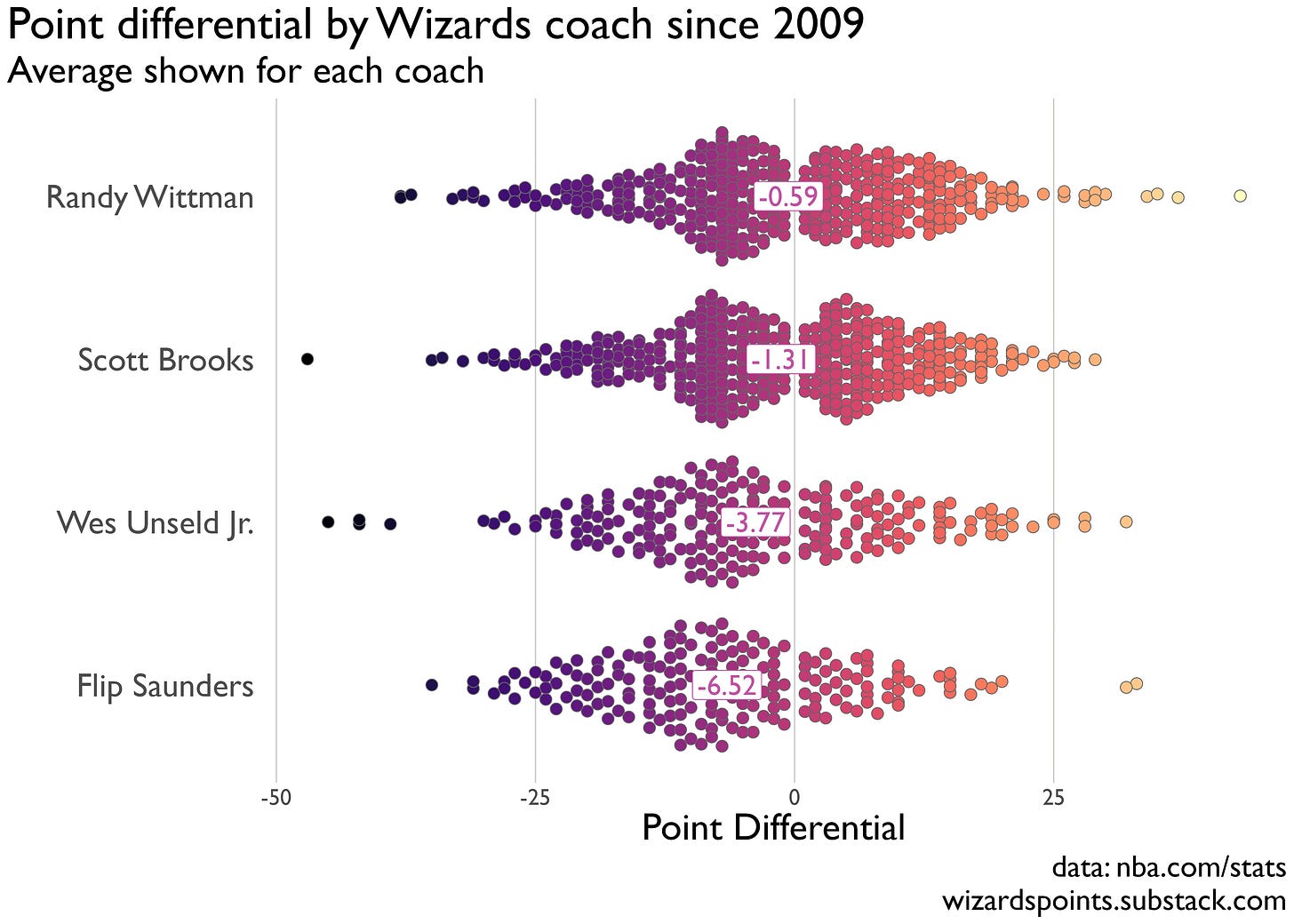Children learn about certain kinds of jobs. You are told people grow up and become firefighters or bakers or doctors. In adulthood, especially if you’re lucky/aimless enough to go to graduate school and/or live in DC, you learn that most jobs are more like “Junior Sales Manager” and “Chief People Officer” and “Program Analyst II (Lead).” As readers likely know by now, Wes Unseld Jr. has gone from the world of recognizable job titles (coach) to the latter category (“front office advisory position” per the Wizards press release).
Being the leader of any organization or group is taxing. Everyone knows how they would do things if they were in charge, but they’re not in charge, you are and you have to convince them to do things your way. It almost goes without saying that organizations reflect their leaders. The Wizards have had coaches that were jerks and coaches that were non-entities; guys like Wes Unseld Jr., who players said was nice, and guys like Scott Brooks, who players cursed out. Neither type of coach has really brought success, at least not sustained success. Still, it’s worth looking back at WUJ’s tenure and seeing how he stacks up.
As a fan, every coach I’ve seen the front office hire seems like the worst coach to ever lead the Wizards at least until the next guy comes along. But being a coach involves a lot more than drawing up plays. It requires managing 15 egos, plus a whole staff, plus the sometimes contradictory incentives and mandates of ownership. I don’t know all of the ways WUJ compares to Flip Saunders or Eddie Jordan in the day-to-day stuff that makes some managers motivating to work for and some miserable. But in theory that stuff should add up to something approaching on court performance. So let’s take a look at where our recently promoted coach ranks and see if there is any thing to learn from the wild mild ride that was the WUJ experience.
Stacking Ls
As much as winning isn’t everything, especially for the current rebuilding team, it is a good starting point for seeing how WUJ stacks up compared to his Capital/Washington Bullets/Wizards peers. As shown below, Wes Jr. out performed his Hall of Fame dad. Still, Jr., ranks among the worst full-time, full-season coaches in the organization as far as win percentage is concerned.
This isn’t really a fair comparison, though, because some coaches, like Randy Wittman and Scott Brooks, had flawed but talented rosters, while others, like WUJ or Flip Saunders were given teams that had outlived their usefulness or were never really built for success. Other coaches, like Jim Brovelli, Darrell Walker, and Ed Tapscott, were interim coaches, who were basically there because someone has to coach, right?
Given that different teams have different expectations (i.e., we knew the Wizards would be bad this season, just not, uh, this bad in this way), it’s worth asking how a coach’s record stacks up against what it was expected to be. Luckily, Bill James, the baseball guru, has an expected win percentage formula that is finally coming into its own now that it is being used to better understand the WUJ era.1
As shown below, if we look at the John Wall-era and later coaches, statistical expectations have been low. There are certainly more advanced ways to figure out whether or not WUJ performed well given what he was given (e.g., adjusting for injuries), but I suspect other approaches that would take more time would also provide similar results. Wes Unseld Jr.’s winning percentage was not that far off from where he should have been. This might explain why he was given a new contract and why the front office jumped to defend him after the last two seasons ended poorly by standards such as “does the team win more than they lose” or “do I feel happier or sadder when I think about the Wizards.”
But maybe what matters is not whether or not you lose, but how. If we look at the above coaches and their point differential during their tenures, we can see that WUJ didn’t fare all that well either. None of the Wall-Beal-Kuz era coaches have had winning seasons or even outscored their opponents on average. Among this group, though, WUJ had the fewest 15 point losses. Scott Brooks’ teams got outscored by 15 or more points 59 times, Randy Wittman 52 times, Flip Saunders 43 times, and our dear Wes Jr. only lost by 15 or more points 40 times out of his total 207 games coached. Those 40 games account for 31% of the team’s losses under Unseld Jr.’s leadership. While Scott Brooks is the leader of losing by 15 or more points, including setting the record with a 47 point loss against Utah in 2017,2 he lost by 15 points or more in 28% of his total losses.
Perhaps more relevant to the goals of the team for this season (and arguably the latter part of last season), Wes lost by five points or less in 28 games over his three seasons as head coach. Flip Saunders, whose tenure was a high point of the “moral victory” Wizards is probably the closest comparison to WUJ in that he was let go in January 2012 after a rough start to his third coaching season. Saunders had 27 games that were lost by five points or less, while Brooks and Wittman had 55 and 57 victory-is-just-out-of-reach games, respectively.
Onward and upward
This is not a post to beat up on Wes Unseld Jr. There are coaches who are there to contain and harness the energy of their players and coaches who are simply there. WUJ seemed to be more of the latter. There are coaches who have a stubborn but justified philosophy, but WUJ was often just stubborn. The fact that in his first season players complained that his system and plays were too complex, but that WUJ didn’t adjust to guys not getting it. The fact that he seemed to decide that some players can only play in certain quarters. The fact that Jordan Poole, Shaqtin a Fool mainstay, ranks 157th overall in three point percentage and last in players who appear to know what defense is and has averaged 29.1 minutes per game. All of these facts suggest a slide from stubborn to delusional. It was never clear what WUJ wanted or what he was going for. At least not in the grand scheme of things. Analysts that focus on the set-up of plays, like the good folks at Swish Theory, praised Unseld Jr.’s creativity. But creativity without execution is simply a nice idea.
Coaching is a job we all recognize and only a handful of people actually know how to do. It isn’t actually a simple job. What you learn as an adult is that there aren’t any simple jobs. Former players, guys who have grown up with the game, and deep basketball minds have all come to DC only to be worn down by the slow grind of mediocrity and myopia. With WUJ’s promotion to the front office, the organization seems to be in the process of growing up. Maybe this is the first true turning point in the rebuild. Or perhaps we’ll all be saying, “well, Unseld Jr. wasn’t all that bad” in a season or two after we see what the next guy does.
The formula is as follows, where k is a constant, or in normal words, the minimum number of wins we’d expect a team to get based on league average points scored and allowed. I use 14. Dean Oliver notes in Basketball on Paper that this value is typically between 11 and 17, so I figured I’d take the midway point:
Starting point guard and Isaiah Thomas stunt double, Tim Frazier, who was filling in for an injured John Wall, only had a single field goal attempt in almost 20 minutes of play. Oof.








Oof. Hoping Chief Keefe is tougher and more adaptable. This is encouraging (of course, plenty of Nuggets players sang WUJ's praises): https://www.si.com/nba/wizards/news/washington-wizards-interim-head-coach-brian-keefe-lauded-by-kevin-durant-taught-me-everything-i-know